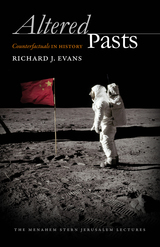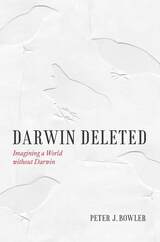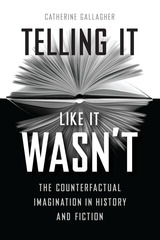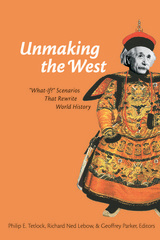8 books about Imaginary histories

Altered Pasts
Counterfactuals in History
Richard J. Evans
Brandeis University Press, 2014
A bullet misses its target in Sarajevo, a would-be Austrian painter gets into the Viennese academy, Lord Halifax becomes British prime minister in 1940 instead of Churchill: seemingly minor twists of fate on which world-shaking events might have hinged. Alternative history has long been the stuff of parlor games, war-gaming, and science fiction, but over the past few decades it has become a popular stomping ground for serious historians. The historian Richard J. Evans now turns a critical, slightly jaundiced eye on a subject typically the purview of armchair historians. The book’s main concern is examining the intellectual fallout from historical counterfactuals, which the author defines as “alternative versions of the past in which one alteration in the timeline leads to a different outcome from the one we know actually occurred.” What if Britain had stood at the sidelines during the First World War? What if the Wehrmacht had taken Moscow? The author offers an engaging and insightful introduction to the genre, while discussing the reasons for its revival in popularity, the role of historical determinism, and the often hidden agendas of the counterfactual historian. Most important, Evans takes counterfactual history seriously, looking at the insights, pitfalls, and intellectual implications of changing one thread in the weave of history. A wonderful critical introduction to an often-overlooked genre for scholars and casual readers of history alike.
[more]

Darwin Deleted
Imagining a World without Darwin
Peter J. Bowler
University of Chicago Press, 2013
The ideas and terminology of Darwinism are so pervasive these days that it seems impossible to avoid them, let alone imagine a world without them. But in this remarkable rethinking of scientific history, Peter J. Bowler does just that. He asks: What if Charles Darwin had not returned from the voyage of the Beagle and thus did not write On the Origin of Species? Would someone else, such as Alfred Russel Wallace, have published the selection theory and initiated a similar transformation? Or would the absence of Darwin’s book have led to a different sequence of events, in which biology developed along a track that did not precipitate a great debate about the impact of evolutionism? Would there have been anything equivalent to social Darwinism, and if so would the alternatives have been less pernicious and misappropriated?
In Darwin Deleted, Bowler argues that no one else, not even Wallace, was in a position to duplicate Darwin’s complete theory of evolution by natural selection. Evolutionary biology would almost certainly have emerged, but through alternative theories, which were frequently promoted by scientists, religious thinkers, and moralists who feared the implications of natural selection. Because non-Darwinian elements of evolutionism flourished for a time in the real world, it is possible to plausibly imagine how they might have developed, particularly if the theory of natural selection had not emerged until decades after the acceptance of the basic idea of evolution. Bowler’s unique approach enables him to clearly explain the non-Darwinian tradition—and in doing so, he reveals how the reception of Darwinism was historically contingent. By taking Darwin out of the equation, Bowler is able to fully elucidate the ideas of other scientists, such as Richard Owen and Thomas Huxley, whose work has often been misunderstood because of their distinctive responses to Darwin.
Darwin Deleted boldly offers a new vision of scientific history. It is one where the sequence of discovery and development would have been very different and would have led to an alternative understanding of the relationship between evolution, heredity, and the environment—and, most significantly, a less contentious relationship between science and religion. Far from mere speculation, this fascinating and compelling book forces us to reexamine the preconceptions that underlie many of the current controversies about the impact of evolutionism. It shows how contingent circumstances surrounding the publication of On the Origin of Species polarized attitudes in ways that still shape the conversation today.
[more]

The End of Middle East History and Other Conjectures
Richard W. Bulliet
Harvard University Press, 2020
The End of Middle East History and Other Conjectures is an unapologetic collection of imaginative essays from thought-provoking Middle East scholar Richard W. Bulliet. Not your ordinary think pieces, this volume collects for the first time Bulliet’s Big Bang–Big Crunch theory of Islamic history and his illuminating conception of the “Muslim South.” Speculations range from future political events to counterfactual histories of how reversal of the outcome of a 1529 battle might have profoundly altered history. After fifty years of posing and answering daring historical questions, Bulliet happily tackles an array of conjectures on subjects as diverse as the origin of civilization, the end of Middle East history, and future interpretations of the twentieth century.
[more]

A Short History of the Future
W. Warren Wagar
University of Chicago Press, 1999
W. Warren Wagar's A Short History of the Future is a memoir of postmodern times, cast as a history. This powerful and visionary book is narrated by a far-future historian, Peter Jensen, who leaves this account of the world from the 1990s to the opening of the twenty-third century as a gift to his granddaughter. A combination of fiction and scholarship, this third edition of Wagar's speculative history of the future alternates between descriptions of world events and intimate glimpses of his fictive historian's family into the first centuries of the new millennium.
"Thanks to Wagar's magisterial command of futurist information and theory, his extrapolated near-term future is an incisive, dynamic vision of where we may indeed be heading."—H. Bruce Franklin, Washington Post
"A comprehensive, massively detailed script of a possible near future. . . . Intriguing."—San Francisco Chronicle
"A Short History of the Future reads with ease, raises provocative possibilities and presents challenging occasions for thought and argument."—Chicago Tribune
"A breathtaking future history in the manner of Wells and Stapledon, unnerving in its mixture of fact, fiction, and personal perspectives."—George Zebrowski, New York Review of Science Fiction
"Thanks to Wagar's magisterial command of futurist information and theory, his extrapolated near-term future is an incisive, dynamic vision of where we may indeed be heading."—H. Bruce Franklin, Washington Post
"A comprehensive, massively detailed script of a possible near future. . . . Intriguing."—San Francisco Chronicle
"A Short History of the Future reads with ease, raises provocative possibilities and presents challenging occasions for thought and argument."—Chicago Tribune
"A breathtaking future history in the manner of Wells and Stapledon, unnerving in its mixture of fact, fiction, and personal perspectives."—George Zebrowski, New York Review of Science Fiction
[more]

A Short History of the Future
W. Warren Wagar
University of Chicago Press, 1992
A dazzling and imaginative combination of fiction and scholarship, this speculative history of the future is a memoir of postmodern times. This second edition shows how the events of 1989 and their aftermath reinforce Wagar's predictions of the future. "A breathtaking future history in the manner of Wells and Stapledon, unnerving in its mixture of facts, fiction, and personal perspectives."—George Zebrowski, New York Review of Science Fiction
[more]

A Short History of the Future
W. Warren Wagar
University of Chicago Press, 1989
In the tradition of H. G. Wells's The Shape of Things to Come, W. Warren Wagar's A Short History of the Future is a memoir of postmodern times. Cast in the form of a history book, the narrative voice of the book's powerful vision is that of a far-future historian, Peter Jensen, who leaves this account of the world from the 1990s to the opening of the twenty-third century as a gift to his granddaughter. A dazzling and imaginative combination of fiction and scholarship, Wagar's speculative history of the future alternates between descriptions of world events and intimate glimpses of his fictive historian's family through the ages.
Jensen's tale traces the flow of the future from the early twenty-first-century reign of a megacorporate global economy, to its sudden collapse in 2044, when nuclear catastrophe envelops the world. In the traumatic aftermath, a socialist world commonwealth comes into being in the year 2062, followed by a lengthy transition to a decentralized order of technologically mature autonomous societies, many located in outer space. The riveting literary interludes that follow each chapter take the form of letters and documents from the history of Jensen's family, evoking the everyday lives of people in the midst of these global-historical events. Here we meet a woman in Brazil whose son is dying from a new immuno-deficiency disease, two brothers comparing life on earth with life in a space colony, and many more.
Neither fiction nor nonfiction, Wagar's brilliantly creative work is not meant to forecast the future, but rather to draw attention to possibilities and alternatives for humankind and planet Earth. In doing so, it also serves as an unforgettable reminder that the future is being made now.
Jensen's tale traces the flow of the future from the early twenty-first-century reign of a megacorporate global economy, to its sudden collapse in 2044, when nuclear catastrophe envelops the world. In the traumatic aftermath, a socialist world commonwealth comes into being in the year 2062, followed by a lengthy transition to a decentralized order of technologically mature autonomous societies, many located in outer space. The riveting literary interludes that follow each chapter take the form of letters and documents from the history of Jensen's family, evoking the everyday lives of people in the midst of these global-historical events. Here we meet a woman in Brazil whose son is dying from a new immuno-deficiency disease, two brothers comparing life on earth with life in a space colony, and many more.
Neither fiction nor nonfiction, Wagar's brilliantly creative work is not meant to forecast the future, but rather to draw attention to possibilities and alternatives for humankind and planet Earth. In doing so, it also serves as an unforgettable reminder that the future is being made now.
[more]

Telling It Like It Wasn’t
The Counterfactual Imagination in History and Fiction
Catherine Gallagher
University of Chicago Press, 2018
Inventing counterfactual histories is a common pastime of modern day historians, both amateur and professional. We speculate about an America ruled by Jefferson Davis, a Europe that never threw off Hitler, or a second term for JFK. These narratives are often written off as politically inspired fantasy or as pop culture fodder, but in Telling It Like It Wasn’t, Catherine Gallagher takes the history of counterfactual history seriously, pinning it down as an object of dispassionate study. She doesn’t take a moral or normative stand on the practice, but focuses her attention on how it works and to what ends—a quest that takes readers on a fascinating tour of literary and historical criticism.
Gallagher locates the origins of contemporary counterfactual history in eighteenth-century Europe, where the idea of other possible historical worlds first took hold in philosophical disputes about Providence before being repurposed by military theorists as a tool for improving the art of war. In the next century, counterfactualism became a legal device for deciding liability, and lengthy alternate-history fictions appeared, illustrating struggles for historical justice. These early motivations—for philosophical understanding, military improvement, and historical justice—are still evident today in our fondness for counterfactual tales. Alternate histories of the Civil War and WWII abound, but here, Gallagher shows how the counterfactual habit of replaying the recent past often shapes our understanding of the actual events themselves. The counterfactual mode lets us continue to envision our future by reconsidering the range of previous alternatives. Throughout this engaging and eye-opening book, Gallagher encourages readers to ask important questions about our obsession with counterfactual history and the roots of our tendency to ask “What if…?”
Gallagher locates the origins of contemporary counterfactual history in eighteenth-century Europe, where the idea of other possible historical worlds first took hold in philosophical disputes about Providence before being repurposed by military theorists as a tool for improving the art of war. In the next century, counterfactualism became a legal device for deciding liability, and lengthy alternate-history fictions appeared, illustrating struggles for historical justice. These early motivations—for philosophical understanding, military improvement, and historical justice—are still evident today in our fondness for counterfactual tales. Alternate histories of the Civil War and WWII abound, but here, Gallagher shows how the counterfactual habit of replaying the recent past often shapes our understanding of the actual events themselves. The counterfactual mode lets us continue to envision our future by reconsidering the range of previous alternatives. Throughout this engaging and eye-opening book, Gallagher encourages readers to ask important questions about our obsession with counterfactual history and the roots of our tendency to ask “What if…?”
[more]

Unmaking the West
"What-If?" Scenarios That Rewrite World History
Philip E. Tetlock, Richard Ned Lebow, and Geoffrey Parker, editors
University of Michigan Press, 2006
What if the Persians had won at Salamis? What if Christ had not been crucified? What if the Chinese had harnessed steam power before the West? Disparaged by some as a mere parlor game, counterfactual history is seen by others as an indispensable historical tool. Taking as their point of inquiry the debate over the inevitability of the rise of the West, the eminent scholars in Unmaking the West argue that there is no escaping counterfactual history. Whenever we make claims of cause and effect, we commit ourselves to the assumption that if key links in the causal chain were broken, history would have unfolded otherwise. Likewise, without counterfactual history we all too easily slip into the habit of hindsight bias, forgetting, as soon as we learn what happened, how unpredictable the world looked beforehand, and closing our minds to all the ways the course might have changed. This collection is thus both an exploration of alternative scenarios to world history and an exercise in testing the strengths and weaknesses of counterfactual experiments.
"If ever there was an argument for the usefulness of counterfactual history, this admirable, and admirably focused, collection has convincingly made it."
—Robert Cowley, editor of the What If?TM series
"With chapters ranging from politics to war to religion to economics and to science and technology, this is the most thematically wide-ranging collection on counterfactuality. An intelligent, cutting-edge study with important things to say."
—Jonathan C. D. Clark, Department of History, University of Kansas
"If ever there was an argument for the usefulness of counterfactual history, this admirable, and admirably focused, collection has convincingly made it."
—Robert Cowley, editor of the What If?TM series
"With chapters ranging from politics to war to religion to economics and to science and technology, this is the most thematically wide-ranging collection on counterfactuality. An intelligent, cutting-edge study with important things to say."
—Jonathan C. D. Clark, Department of History, University of Kansas
"This volume is likely to become a standard reference in the literature on historical methodology, and could have a dramatic impact on the way future generations of historians approach disciplinary inquiry. . . . By allowing readers to share in the doubts and epiphanies that lead up to the authors' epistemological revelations, the volume allows readers to grasp the rich potential of approaching their own research from a counterfactual perspective."
—Aaron Belkin, Associate Professor of Political Science, University of California, Santa Barbara
Philip E. Tetlock is Mitchell Professor, Haas School of Business, University of California, Berkeley, and author of Expert Political Judgment: How Good Is It? How Can We Know?
—Aaron Belkin, Associate Professor of Political Science, University of California, Santa Barbara
Philip E. Tetlock is Mitchell Professor, Haas School of Business, University of California, Berkeley, and author of Expert Political Judgment: How Good Is It? How Can We Know?
Richard Ned Lebow is James O. Freedman Presidential Professor of Government at Dartmouth College and author of The Tragic Vision of Politics: Ethics, Interests and Orders, winner of the Alexander L. George Award for the best book in political psychology.
Geoffrey Parker is Andreas Dorpalen Professor of History at Ohio State University, a Fellow of the British Academy, and author of The Military Revolution: Military Innovation and the Rise of the West, 1500-1800, winner of two book prizes.
[more]
READERS
Browse our collection.
PUBLISHERS
See BiblioVault's publisher services.
STUDENT SERVICES
Files for college accessibility offices.
UChicago Accessibility Resources
home | accessibility | search | about | contact us
BiblioVault ® 2001 - 2024
The University of Chicago Press









